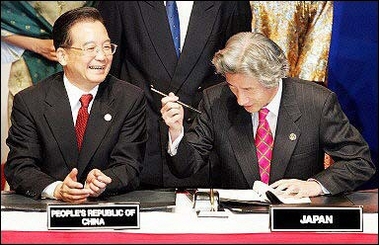|
Nation restarts high-level talks with Japan
(AFP)
Updated: 2006-02-21 20:41
China said it would hold its highest level talks with Japan in five months,
but insisted it would not soften its stance on Japanese Prime Minister Junichiro
Koizumi's war shrine visits.

Chinese Prime Minister Wen Jiabao laughs as
his Japanese counterpart Junichiro Koizumi (R) acknowledges cheers during
the signing ceremony of the declaration of the ASEAN summit in Kuala
Lumpur, in December 2005. China said it would hold its highest level talks
with Japan in five months, but insisted it would not soften its stance on
Koizumi's war shrine visits. [AFP] |
China said Premier Wen Jiabao would meet with Japan's minister of economy,
trade and industry, Toshihiro Nikai, who was due to land in Beijing on Tuesday
night for a short visit aimed at easing the ongoing bilateral tensions.
"During the visit he will meet with Premier Wen Jiabao and state councilor
Tang Jiaxuan," Chinese foreign ministry spokesman Liu Jianchao told reporters at
a regular briefing on Tuesday.
Nikai will become the first Japanese minister to meet a top Chinese official
since Koizumi's latest visit in October to a Tokyo war shrine that Beijing says
glorifies Japan's militant past.
"I want to take any step forward in order to resolve problems lying between
Japan and China," Nikai, a dove in Koizumi's hawk-dominated cabinet, said ahead
of his departure.
But Liu reiterated in Tuesday's briefing that the visits to the Yasukuni
shrine remained a source of Chinese fury.
"On this issue, Japan should not have any illusions, make any excuses or find
any pretext to cover up their acts or even push the responsibility to the
Chinese side," he said. "All these efforts will be in vain."
Liu said China required Japan to take "the correct view" on the Yasukuni
issue.
"This is an important political foundation for Sino-Japan relations. If this
is undermined, then Sino-Japanese relations would also be undermined greatly,
just like what is happening today."
Just ahead of Nikai's departure, Koizumi described himself as an "an advocate
of Japan-China friendship" and said he had sent Nikai to try to generate a thaw
in the relations.
"I have asked (Nikai) to discuss what is necessary for our future-oriented
ties and friendship," Koizumi told reporters.
Nikai was already scheduled to meet Chinese Commerce Minister Bo Xilai during
his visit, which ends Thursday.
The head of the ruling Liberal Democratic Party's top policy making body,
Hidenao Nakagawa, has also been in China since Sunday as part of Japanese
efforts to defuse its row with China.
A Beijing-based Japanese official, who did not want to be named, said Nikai's
trip would be a step forward in efforts to ease tensions between the two
nations, even if he makes no concrete progress.
"In the last few months, there has been almost no communication between the
top leaders of the two countries. So in that sense, it's a positive sign for
Japan-China relations," he said.
One focus of Nikai's talks will be economic issues, including gas development
in a disputed area of the East China Sea.
Relations between China and Japan have plummeted particularly over the
Yasukuni war shrine issue, but also over the rival East China Sea claims and
allegations involving the 2004 suicide of a Japanese diplomat in China.
Joseph Cheng, a China watcher at the City University of Hong Kong, said both
nations were now hoping to improve chilly ties after a very rocky few months in
which nationalist fervor surged on both sides.
"There is a good opportunity in the sense that nationalist feelings on both
sides have subsided a little and both sides have in fact been working hard to
reestablish these contacts," he said.
In another bridge-building effort, Japan's Chief Cabinet Secretary Shinzo Abe
said Tuesday the Japanese government wanted to launch a joint study with China
on their common history as soon as possible.
China harbors deep bitterness at the atrocities committed by Japanese troops
during their wartime occupation from 1931 to 1945, including a massacre in the
Chinese city of Nanjing in 1937.
|